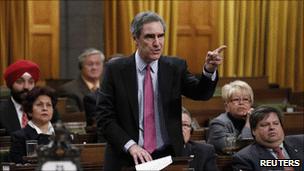Canada parliament begins no-confidence debate
- Published

Liberal leader Michael Ignatieff said the Harper government "conceals the facts" from Canadians
The Canadian parliament has begun debate on a no-confidence motion expected to topple the Conservative minority government.
Liberal Party leader Michael Ignatieff said Prime Minister Stephen Harper's government "breaks the rules" and "does not deserve to remain in office".
If the motion passes on Friday, it will trigger an election in early May.
The vote stems from a ruling on Monday that the Conservative government was in contempt of parliament.
A parliamentary committee judged that Mr Harper's government had acted in contempt by failing to disclose the full costs of spending on programmes involving tougher crime legislation, corporate tax cuts and plans to purchase stealth fighter jets.
'Reckless actions'
"The House must speak with a clear voice and it must say that a government that breaks the rules and conceals the facts from the Canadian people does not deserve to remain in office," Mr Ignatieff said.
Conservative House of Commons leader John Baird spoke on behalf of the Conservative Party ahead of the confidence vote.
"I'm saddened that a parliament which has accomplished a lot recently will come to an end because of the reckless actions of the [opposition]... in forcing an unwanted and unnecessary election on Canadians," he told legislators.
Mr Baird warned a vote of no-confidence in the government would "weaken Canada's economic recovery".
Also at issue is the Conservative government's budget plan, which it unveiled on Tuesday and which was immediately rejected by the three opposition parties.
With four parties holding seats in the House of Commons - the New Democrats (NDP) and the Bloc Quebecois in addition to the Liberals and Conservatives - it is difficult for a single party to gain a majority.
The Conservatives came to power in 2006 but need opposition support in order to pass any legislation.
Recent polls suggest the Conservative party will retain power in a May election, although not necessarily win enough seats to take the majority.
- Published24 March 2011
- Published24 March 2011
- Published23 March 2011
- Published22 March 2011